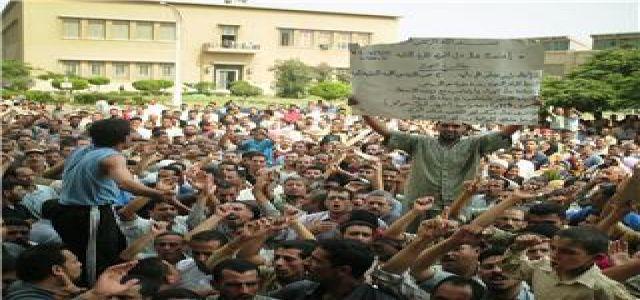- Other Blogs
- July 31, 2008
- 5 minutes read
Face-off with Facebook

When a group of young activists decided to celebrate the 56th anniversary of the 23rd of July Revolution it didn”t cross their minds that, along with other crimes, they would be charged with “attempting to topple the regime”. Yet that is what happened last Wednesday on Sidi Bishr beach in Alexandria when security forces detained 14 young people as they were singing patriotic songs and flying kites with the colours of the Egyptian flag.
Thirty members of the so-called 6 April Youth Movement — formed on the popular social networking website Facebook and named after the 6 April strike — met in the headquarters of the Ghad Party in Alexandria to show solidarity with its jailed leader Ayman Nour. Later they headed to Sidi Bishr wearing t-shirts with the 6 April Movement logo and singing patriotic songs. Police officers forced them off the beach and onto the streets of Al-Raml where they continued singing and waving flags, one of which was attached to a kite.
“A truck packed with Central Security personnel arrived and arrested 14 of the 30 demonstrators while the rest managed to flee,” Gamal Eid, executive director of the Arab Network for Human Rights Information, who met the arrested group while in custody, told Al-Ahram Weekly. “They were beaten by plain clothes security personnel and taken to Al-Raml Police Station where they were referred to the prosecution which accused them of assembling, hampering traffic, and attempting to topple the regime.” The arrested denied any links with political parties or the Muslim Brotherhood. “They told investigators that they did not advocate destructive ideas, let alone toppling the regime. They said they would not even incite people to stage a civil disobedience,” says Eid.
The detention of the 14 activists triggered a wave of condemnation from local and international human rights organisations. Amnesty International said the arrested should be considered “prisoners of conscience, detained for their participation in the protest”. It urged all concerned parties and individuals to “send appeals to arrive as quickly as possible urging the authorities to immediately and unconditionally release them and all other members of the 6 April Youth Facebook group…” It also called for “a thorough and impartial investigation into allegations that the protesters were beaten by riot police and security forces, and that State Security Investigations” (SSI) agents verbally abused and threatened the protesters at the Al-Pharana SSI office, with the results made public and those responsible brought to justice.”
Egypt”s Protesters Defence Front also condemned the detention of the activists, saying “these tyrannical practices adopted by the government reflect a muzzling of the right to peaceful expression”. A group of lawyers has filed a complaint with Prosecutor-General Abdel-Meguid Mahmoud calling for the release of the detainees.
Although the Al-Manshiya Felonies Court ordered the release of the detainees on Monday they have now been transferred to Borg Al-Arab jail according to their lawyers. Only one, Mahinar El-Masri, was released, while 13 were remanded in custody for 15 days pending interrogation.
Bloggers, and Facebook activists in particular, have become a thorn in the Egyptian authorities” side, especially after attempts to organise a nationwide strike on 6 April in support of textile workers in Al-Mahala Al-Kobra.
“The government believes that the number of cyberspace activists, most of whom are not affiliated with political parties, is growing steadily. What really worries them is that these young activists are ordinary people who have the potential to organise a demonstration or a strike,” says Eid.
Blogger and activist Mina Zekri agrees. “The authorities have clamped down on the 6 April activists because they are terrified of the idea that ordinary people, without any political party affiliation, are developing the potential to instigate political action. Even the phrase “6 April youth” is enough to ruffle the feathers of the government. The security apparatus clearly believes that this kind of opposition has the ability to incite people to demonstrate. That”s why they hit them hard in Alexandria, where they were just flying a kite with an Egyptian flag attached to it.”
Interviewed earlier by Al-Ahram Weekly Ahmed Maher, one of the founders of the 6 April Youth group who was among the detained activists, said he was determined to continue his Facebook activities.
“We are debating the best ways to use the website to organise more activities,” he said. Despite receiving telephone threats he remains determined to transform his Facebook group into a political movement. “What I fear most [after oppressing the activists] is that people might sink back into the perception that getting involved in politics is a really risky business.”



